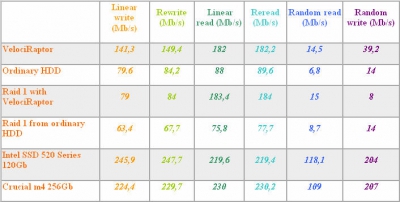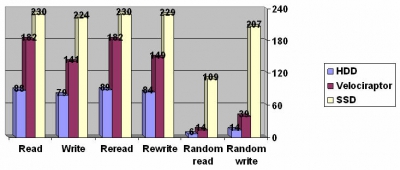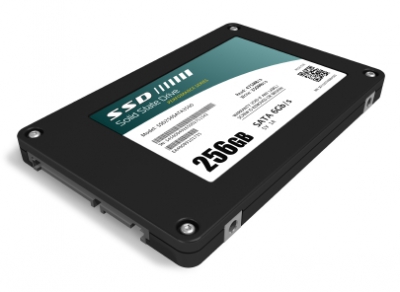What is a solid state drive?
In effect, solid state drives use principles similar to Flash-cards but in terms of technology SSDs moved well ahead. Modern SSD is quite a complex data storage system. Disk controller monitors the condition, adjusts usage of different blocks to make sure that wear-out is even and also replaces bad blocks with new ones from a special reserve. The size of such area in top manufacturers can reach up to 10% of the basic storage capacity. Since SSDs don’t have mechanically mobile heads no time needed to position them. Read/write speed of SDD cell is several times higher than of HDD and transaction can occur in several flows. Absence of moving parts reduces disk overheating and hence energy consumption.
Mechanical reliability of SSDs increases year by year. Their life cycle is still estimated on the basis of write cycles, although nowadays manufacturers guarantee at least 3 to 5 years of flawless operation. Perhaps there won’t be full conversion to SSDs in the nearest future, but area of application will definitely continue expanding.
Back to data
We have carried out a number of tests to compare the performance of drives based on different technologies. The participants of testing:
• Server series RE4 hard drives of Western Digital.
• Server hard drives Western Digital VelociRaptor with increased up to 10,000 RPM of spindle
• Intel and Crucial SSD storage devices.
The results:

SSDs gained the lead in all tests, edging all the rivals. Please take note of correlations. If at read/write it was simply higher, at random read/write it was several times higher! It is an undeniable advantage since most server operations are random reads and writes.

Where SSD advantages can be used?
Most common option to use SSD – installing operating system to it. It considerably increases speed of all file operations.
Besides OS, database servers are also very sensitive to drive performance. Using “fast” drives streamlines execution of multi aspect requests to large tables and data writes to the data base. Increased transaction reliability is also critical because data is transferred from volatile RAM to SSD in a very fast manner.
High traffic websites, especially those containing large volumes of images, media files and text, benefit a lot in performance from using SSDs. Even archived or rarely requested material that is not available in web-server’s cache, will be found, loaded and forwarded to user in a very fast manner.
If project requires working with large data volumes, SSDs can also help playing the role og cache for main capacious hard drives. It will reduce load on main disk array and increase access speed to frequently used data.



 Why do you have to read this post till the end?
Why do you have to read this post till the end?
